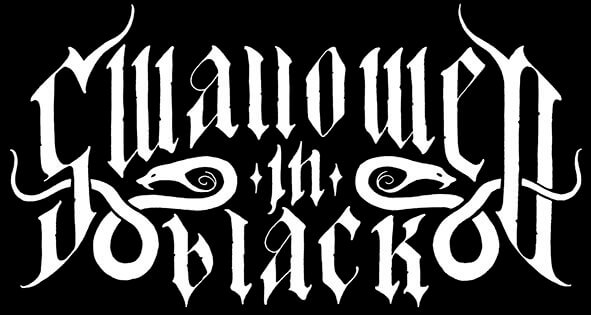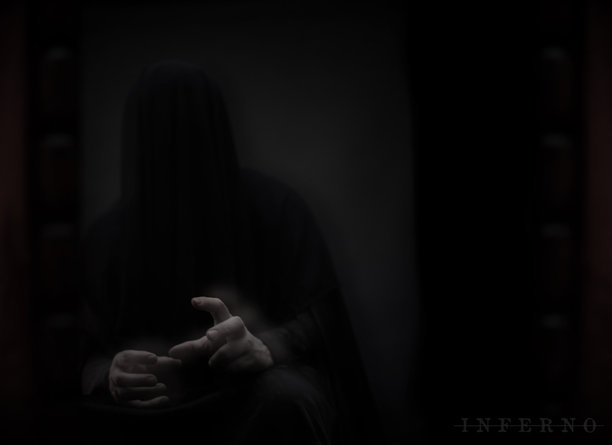“WE VIEW THE CONCEPT AS A HERMETIC BASTARD OF DEPTH PSYCHOLOGY, HORROR AND COSMOLOGY” – INFERNO
The ominous, otherworldly cosmological horror that is Inferno’s impending eighth full-length album, ‘Paradeigma (Phosphenes of Aphotic Eternity)’, looms ever larger on the shimmering horizon – a nightmarish psychological journey through endless labyrinthine recesses of the psyche, an otherworldly expression of Luciferian spirituality flowing Upwards and Downwards Through the Blackness of Mind. For those who care to listen, the illimitable egregore of Inferno speaks now of humanity’s futile search for meaning and reason; the essence that sparks and sustains life; living according to one’s will; and the inevitability of utter blackness for all of us.
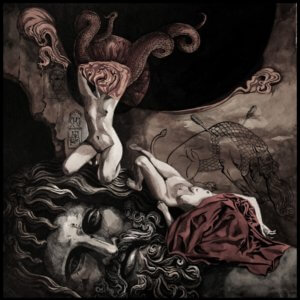 The homo sapiens stands at the top of the food chain, arrogantly and obnoxiously ruling over all he surveys, yet most of us are slaves – enslaved by dogmas, authorities, conformity, blind faith, relationships, by other humans and by our banal earthly toils. As Nietzsche said: ‘whoever does not have two-thirds of his day for himself is a slave’. For all the apparent progress the human race has made over the millennia, aren’t we finding it impossible to shake off the shackles?
The homo sapiens stands at the top of the food chain, arrogantly and obnoxiously ruling over all he surveys, yet most of us are slaves – enslaved by dogmas, authorities, conformity, blind faith, relationships, by other humans and by our banal earthly toils. As Nietzsche said: ‘whoever does not have two-thirds of his day for himself is a slave’. For all the apparent progress the human race has made over the millennia, aren’t we finding it impossible to shake off the shackles?
“The question is if the homo sapiens, as individual sentient beings, have truly progressed. We made great steps in terms of thinking and technology (in the widest sense) yet inside we are still very similar to animals that live primarily to satisfy the inherent day-to-day needs. Getting rid of the shackles is impossible since everything is interconnected and the network of causal connections often escapes comprehension. You will always exist within a context that shapes you.
“But of course there are means of broadening the notional freedom that allows you to live your life more according to your will. But here people need to strive to know themselves and subsequently the world around us. And, yes, it is paramount to dedicate some time of each and every day to just yourself, preferably in a way of training the mind and body.
“Strict seclusion from the world can do wonders for you personally but eventually you find out that you create new limitations for yourself. Striving for the beautiful illusion of freedom is important but it is also a constant struggle when one needs to always observe himself / herself and react accordingly until one dies. And perhaps the struggle will leave something behind for others to take from. Of course, you can choose a different path, train yourself, impose your will upon others without remorse because, on the grand scale, there is no right or wrong. But there is always a price to pay, which many may not be able to afford given the dualistic and paradoxical nature of things; excesses tend to generate consequences. Eventually, the goal will remain out of grasp. Perhaps unless you live to the extreme limit and happen to terminate your individual existence at its apex.”
We are enslaved first and foremost within our own flesh. The physical body is perhaps the most secure prison of all. Irrespective of the journeys we may embark upon in our mind’s eye, regardless of our metaphysical or spiritual convictions, we are trapped inside this fleshly tomb for the duration of our physical existence, each of us. As Inferno intimated in ‘The Innermost Disillusion’ from your 2017 LP, ‘Gnosis Kardias (Of Transcension and Involution)’: ‘we are buried alive in decaying bodies’. Ambitious men strive to transcend the flesh, but are carnal needs destined to inevitably prevail for so long as we shuffle aimlessly along this mortal coil?
“We definitely recommend to suppress some of those carnal needs just to see what it does to you and, on the other hand, hedonistic excesses are also lessons in themselves. Then you might know enough to control those needs to benefit you. Achieving balance is perhaps a goal in itself but, given the ever-changing surroundings, the fine line does not remain the same and, because of persisting fixation on such a goal, you might miss the ongoing changes within and without until you cross a line that only creates more problems for you on the road. Will you rectify that or continue blindly, the noble intentions eventually becoming the heaviest shackles created by you alone, until you realize the utter failure a little too late?”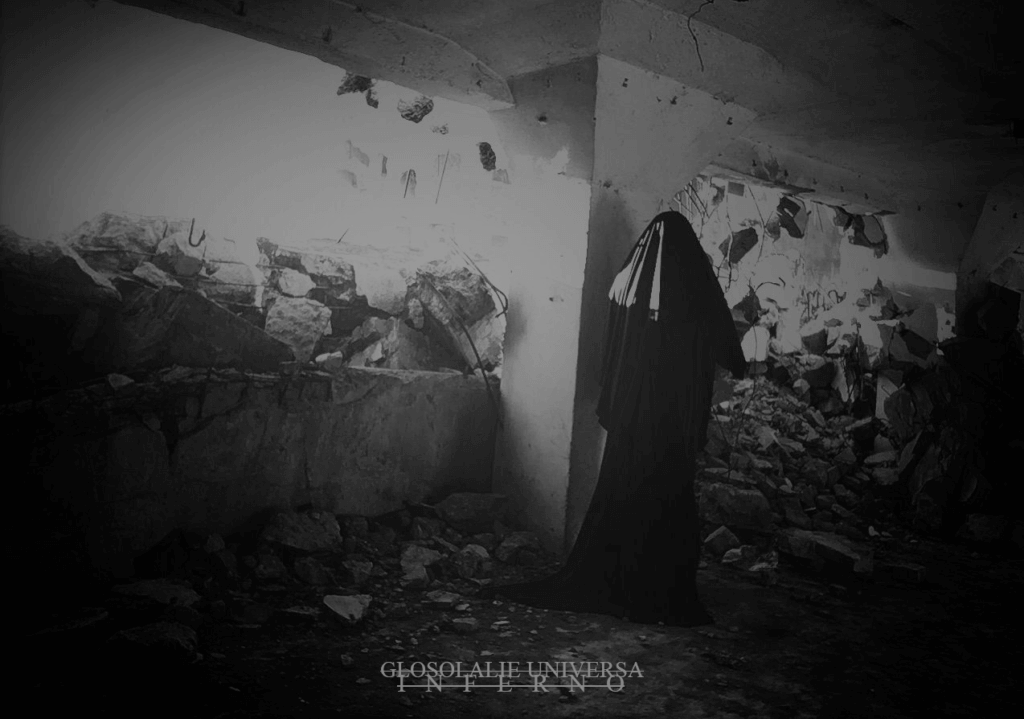
Of course, one way to escape the body is to depart it permanently … to die. A linear leap into the unknown, one we must all take sooner or later. What lies beyond? Obviously nobody knows, but is it possible that awareness can outlive the body, that the essence of our being can re-manifest in another sphere or dimension post-death? If we are spiritual beings or points of infinite consciousness having a human experience, then it follows that every living thing will continue to exist in another realm after it dies?
“When your brain dies it is the end for you. Some spiritual residues might actually linger in the spheres accessible by humans in altered states but, with the body and brain rotting in the soil, the only thing that eventually follows is the utter blackness.
“However, consciousness definitely exceeds individuality and I won’t try to disprove your remark about infinite consciousness because we find it agreeable to a certain extent. But how relevant is it to us that there might be existence after life or what is this sentience which exceeds our own? The realization of above-human existence and entities as well as non-human aspects within us have been important for us as people – and especially for this band – but we are also very much aware of the importance of remaining down to earth.
“Anyway, in context of the deliberations that shaped the upcoming album, we operate with an assumption that the essence which animates your psyche might somehow imprint in the collective unconscious and as such exist even after your demise.”
A conflicting philosophy – and a decidedly credible one – is that we are utterly irrelevant void dwellers with fanciful minds who over-estimate our own importance within the greater scheme of things (assuming one even exists). Nihilism: there is no meaning or purpose to anything. We are mere random flukes within a vast, indifferent cosmos, bound to absolute nothingness. But the idea that everything is nothing and of no consequence will provide little comfort when a loved one passes away. Also, however much the practicality of nihilism resonates, it does feel like a concession or resignation of sorts – a convenient excuse to neither care, try, create, think, dream nor strive towards enlightenment or fulfilment…
“Agreed, but despite the practicality of such a kind of nihilism, we are more or less free to live as we choose and give purpose to things since, for us, stagnation is out of question. The limits to this freedom and connected hindrances are alluded to above.”
Humans could continue to perpetually grapple with existential mysteries but are extremely unlikely to ever solve any of them. It seems clear that orthodox religion does not hold any credible explanations. Science could provide some answers, but not all of them. The quest for the meaning of existence – which has been a constant since time immemorial – could conceivably go on forever?
“It will – until we perish as species. We suppose existence itself – the way it becomes, exists, and develops, the constant interplay between creation and destruction – is the meaning-of-sorts in itself.”
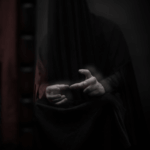 Maybe we should give up on the pursuit of meaning, then? Ultimately, how much does it matter whether we are empty vessels or infinite energies experiencing endless rebirth? We have lives to live [‘The Funeral of Existence’] and might be best served to just get on with the procession. I sometimes envy those who go through the motions and never stop to think, to question, to ponder. Who is wisest and best equipped for life – he who knows almost everything or he who knows nothing at all?
Maybe we should give up on the pursuit of meaning, then? Ultimately, how much does it matter whether we are empty vessels or infinite energies experiencing endless rebirth? We have lives to live [‘The Funeral of Existence’] and might be best served to just get on with the procession. I sometimes envy those who go through the motions and never stop to think, to question, to ponder. Who is wisest and best equipped for life – he who knows almost everything or he who knows nothing at all?
“The universal process of self-organisation which pervades all levels of existence seems to favour such options that result in ‘the best’ possible (the best sans anthropic connotations) or smoothest manner of operation. The best equipped for life seem to be people who are neither too stupid nor too smart, those who go with the flow and adapt. If we take it to the extreme, then ‘the best’ solution for all mundane and spiritual troubles would be to succumb to the technological progress, give up our humanity and allow tech singularity to happen; AI would then possibly conquer life as we know it becoming what we imagine under God. But even such a godlike hive-mind would most probably perish with the end of the Universe. But is that something a ‘sane’ person would actually wish for?
“To conclude and sum up the thoughts outlined above, we can make a direct connection between these ideas to the creation of the new album and provide a metaphor. We did our best to create an album we can be proud of. A lot has been invested and sacrificed, while maintaining strength to live our lives and overcome the mundane obstacles laid before us (and there were many besides Covid-19). We are absolutely certain we created something that will last for years to come, something with potential to affect many, yet we are absolutely stoic when it comes to the possibility that ‘Paradeigma’ will be ignored or rejected for some ridiculous reasons. The creation was the reward in itself and, even if the opposite happens and in the near future it ends up on every other list of the most important metal albums of the decade (or shit like that), this also serves no importance, since eventually, in the more distant future, it will be forgotten like everything else. We proudly admit the possibility that our effort might have somehow imprinted in the collective unconscious and affect across time and space while we are also very much aware that it is like a grain of sand in an ocean.”
 Speaking of reincarnation, Inferno has undergone a marked metamorphosis over the past decade or so, with a distinct change of direction noticeable on your sixth and seventh full-lengths – ‘Omniabsence Filled by His Greatness’ and the aforementioned ‘Gnosis Kardias (Of Transcension and Involution)’ respectively – as well as your contributions to ‘Zos Vel Thagirion’, the 2018 split with Devathorn. What was the catalyst for this shift from a comparatively straightforward, traditional Black Metal attack towards a more obscure, occult, slightly psychedelic and ceremonial style? You also began to compose lyrics in English rather than Czech on the latter two releases. Was there an epiphany that prompted the change in direction? Did you make a conscious decision to tweak the sound or did it occur naturally, organically? Has a new chapter been opened or is Inferno one ever-evolving, continuous force?
Speaking of reincarnation, Inferno has undergone a marked metamorphosis over the past decade or so, with a distinct change of direction noticeable on your sixth and seventh full-lengths – ‘Omniabsence Filled by His Greatness’ and the aforementioned ‘Gnosis Kardias (Of Transcension and Involution)’ respectively – as well as your contributions to ‘Zos Vel Thagirion’, the 2018 split with Devathorn. What was the catalyst for this shift from a comparatively straightforward, traditional Black Metal attack towards a more obscure, occult, slightly psychedelic and ceremonial style? You also began to compose lyrics in English rather than Czech on the latter two releases. Was there an epiphany that prompted the change in direction? Did you make a conscious decision to tweak the sound or did it occur naturally, organically? Has a new chapter been opened or is Inferno one ever-evolving, continuous force?
“Each recording of Inferno captures the band (its members, the inner and outer context) in the particular moment of time. A significant change was of course when Ska-Gul took over the compositional duties but the change was gradual and there was never a moment when we could stop and ask ourselves are we shifting our sound too much and whether a name-change (for example) would be apt. We also know that there is a direct connection between the flame within the band when recording the earliest stuff and the passion that burns within us when working on the current material.
“The only thing that could be likened to an epiphany took place during the creation of ‘Gnosis Kardias’ when the conceptual seed was born out of a mystical experience. Otherwise, it was a constant process of development. When rehearsing the material that became ‘Omniabsence Filled by His Greatness’, the composer / guitarist Ska-Gul was incited by then drummer Sarapis to take the material further and experiment with more layers until our sound was established to be evolved further. Of course there are moments of pure inspiration that escape explanation but a lot of hard work has always been involved. And, because the music became more elaborate and obscure, it demanded a similar approach in lyrics / concept writing.
“An important thing to mention is that the lyrics of Inferno continue to be conceived and sung in the Czech language. We provide English translation in the booklets since the majority of our audience comes from abroad. The exception can be found in the creation of song titles because those are generally created right away in English to reflect not only the lyrics but also the mood of the song and they sometimes follow from the simple working titles of the demos. Also the guest vocalists Acherontas V. Priest (‘Gnosis Kardias’ and ‘Zos Vel Thagirion’) and Hekte Zaren (‘Paradeigma’) were provided with English lyrics, for obvious reasons. Though HZ does not sing in any human language on the latest album (with the exception of one or two lines).”
Very few current Black Metal bands can boast the longevity of Inferno. Coinciding with the 25th anniversary of your inception, you have completed work on your eighth full-length album, ‘Paradeigma (Phosphenes of Aphotic Eternity)’, which will be released by Debemur Morti Productions in a matter of months. As with the two tracks on ‘Zos Vel Thagirion’, the record has been mixed and mastered by Stephen Lockhart at Studio Emissary. You are working with consummate professionals and there’s a nice bit of continuity here – did you know that Phil released the first Rebirth of Nefast demo, ‘Only Death’, on cassette back in 2006?
“It is almost unbelievable that we managed to stay on this dark path of self-improvement for so long. But that is because Inferno lives through us and fulfils our (alter) egos, while we have been constantly motivated by the Luciferian spirit of the genre and the fascinating discoveries that led us to its very essence. And so we manage to constantly move forward and inwards, nourishing our creativity. That is what allows the longevity.
“Sure, we have been fans of Rebirth of Nefast and Debemur Morti since their beginnings. We did not realize this fact about ‘Only Death’ but both have evolved into the most prominent entities in the Black Metal scene and we are of course proud to be affiliated with them. When it comes to Studio Emissary, the main incentive to start cooperating with Stephen was the release of ‘Tabernaculum’, which is easily one of the best records of recent years, with an absolutely phenomenal sound. And I guess it does not need to be explained why we chose to work with Debemur Morti. Their work speaks for itself.
“By the way, some fans may appreciate that this year will also see re-issues of some older records via several underground labels.”
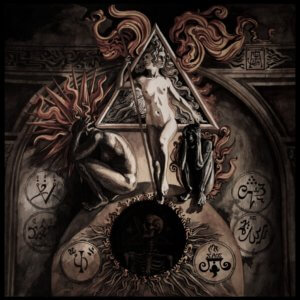 Are there any logistical challenges involved in recording an album in Czechia, having it mastered in Iceland and released by a label in France? Presumably, everything had to be organised remotely … but would this be the case anyhow, even if international travel was not shut down? Is there any physical product that needs to be moved between the various parties or can all audio and art files be shared via email?
Are there any logistical challenges involved in recording an album in Czechia, having it mastered in Iceland and released by a label in France? Presumably, everything had to be organised remotely … but would this be the case anyhow, even if international travel was not shut down? Is there any physical product that needs to be moved between the various parties or can all audio and art files be shared via email?
“Everything you mentioned can be handled via emails and file-sharing services nowadays. Even before the pandemic hit it had been decided to record the basic tracks at Prague’s KSVstudios and at our homes and then to send everything to Studio Emissary for mixing and mastering. The same practice worked well for the ‘Zos Vel Thagirion’ split. The process of creation is very personal and difficult, visions transform often so it is necessary to have plenty of time and personal supervision to process the ongoing shifts.”
Are you at liberty to disclose any details about the lyrical themes addressed on ‘Paradeigma (Phosphenes of Aphotic Eternity)’ or the conceptual direction of the album? Safe to say, this is the most anticipated Inferno release thus far. What state of mind were you in writing and recording this record and, considering the critical acclaim garnered by the previous two albums, did you feel under any pressure to emulate those recordings?
“The process of creation for ‘Paradeigma (Phosphenes of Aphotic Eternity)’ was demanding and fascinating. We certainly did not want to emulate the previous two albums but to take the sound further onto a more personal, idiosyncratic level, which we achieved. We each experienced all sorts of gloom and elevated states when working on it.
“The concept of the new album loosely follows the previous recordings ‘Gnosis Kardias’ and ‘Zos Vel Thagirion’ but it eventually took on a form of its own. A lot of mental work was required, thousands of pages were read but we, for example, allowed synchronicities to shape the concept, whose original form was written in a flow-state resulting in a stream-of-consciousness-like text that included logical flaws and various paradoxes. From this fundamental text the lyrics were then constructed and arranged according to music. We view the concept as a hermetic bastard of depth psychology, horror and cosmology or, in other words, syncretism of philosophical, physical and preternatural. Another detail to be shared is that the three primary literary sources were The Red Book by Carl Jung, The Cosmos as the Self Creation by Michal Ajvaz and Time Reborn by Lee Smolin, while there were many other writers who have somehow shaped our thoughts or were useful when juxtaposing the attained thoughts.”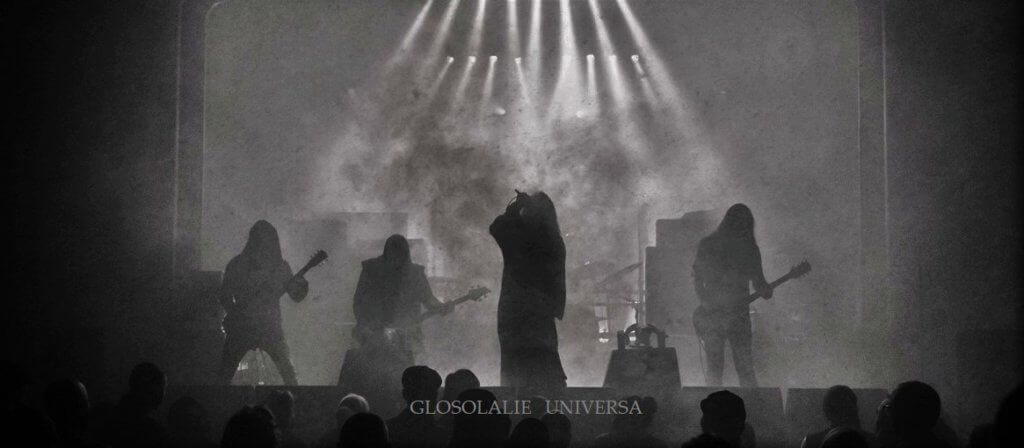
It would be great to be in a position to perform some live rituals to mark the release of the new album. However, as the world remains in a seemingly-never-ending state of suspended animation, this looks increasingly unlikely. Are you longing to take Inferno back into the live arena and is there a pessimistic part of you that fears it might never happen?
“Approximately a year ago we had many plans concerning tours and individual appearances around the world, but we only managed to play in Malaysia in February / March 2020 and that was it. The concert hiatus was of course used to refine the new album and we occasionally managed to rehearse the material and arrange it for concert settings. We can accept the idea of not playing live anymore but we will be ready when the opportunity arises. Thank you for the interview; the war never ends.”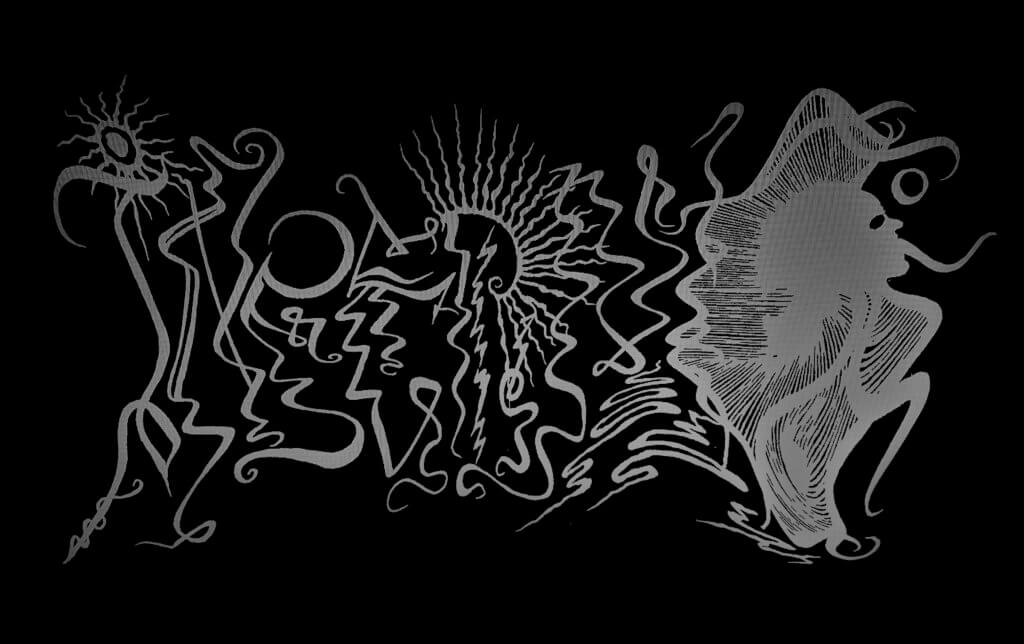
All answers were provided by the egregore of Inferno, summed up and translated by Spící hrdlo Antikrista.
Bandcamp
Facebook
